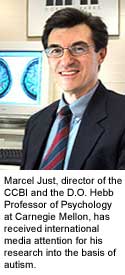Marcel Just is a pioneer in probing what has been for years the undiscovered country of human development: how humans understand language, perform mental tasks and form memories, and whether there is a source of thought and emotion—what people traditionally have called “the mind”—that is separate from the physiological brain.

Just, the D.O. Hebb Professor of Psychology, leads Carnegie Mellon’s Center for Cognitive Brain Imaging. He and other Carnegie Mellon researchers have discovered that thought arises from the brain’s neural network. In other words, it is biologically based.
Lately Just has turned his attention to the mysterious brain disorder autism, which impairs verbal and non-verbal communications and social interactions. Using functional magnetic resonance imaging (fMRI) scans, which show what parts of the brain are active during specific cognitive tasks, he has found numerous abnormalities in the activity of brains of people with normal IQs who have autism. Just’s work has garnered international media attention, and he recently was featured on the NBC Nightly News.
Two recent findings stand out. One, people with autism display a lack of coordination among the different areas of their brain, which explains a paradox of autism. Some people with autism have normal or even superior skills in some areas, while many other types of thinking are disordered. Complex thinking and social interaction require various parts of the brain to work in concert, and this does not appear to be happening in people with autism.
In a related study, Just and his co-authors found differences in the activation and synchronization of brain networks between people with autism and those without it. People with autism but normal IQs performed some tasks as well as those without autism, but used different parts of their brain to do so. Just once again found a lack of overall synchronization among the brain regions in people with autism.
Taken together, the results of these and other autism studies suggest that possible treatments of autism might include instruction and training that focuses on the integration of the types of processing performed by different brain areas.
Related Links:
Marcel Just
Center for Cognitive Brain Imaging
The Center for the Neural Basis of Cognition:
Psychology Department



